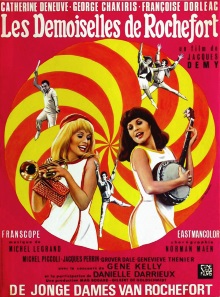
If one didn’t already know that this film was directed by the same director, Jacques Demy, who made The Umbrellas of Cherbourg, you surely will within five minutes of it starting. Like the previous film, this is a musical though it is a more traditional one with musical set-pieces in between normal scenes with dialogue. There’s plenty of dancing too as it features Gene Kelly as a sort of special guest star.
Twin sisters Delphine and Solange (played by Catherine Deneuve once again and joined by her real-life sister Françoise Dorléac) live in the small seaside town of Rochefort but dream of going to Paris and finding the man of their dreams. Their mother runs the cafe in town which serves as a meeting point for many residents, including a young sailor who searches for his personification of the feminine ideal. She herself pines for an old lover whom she abandoned long ago due to his embarrassing name. Meanwhile the town is celebrating the Festival of the Sea, bringing many visitors including a duo of roguish carnie hired to organize performances.
Whenever each new character is introduced to the audience, he or she gets a musical sequence to sing their own personal song which pretty much tells you the story of their life. The two leading ladies can’t even walk down a street without doing a little song and dance routine that draws in other pedestrians. Even more convenient is the way that two lovers who are meant to be with each other sings the counterpart of each other’s songs so there’s never any mystery about who is going to end up with who. All this means that as opposed to the also recently watched Gentlemen Prefer Blondes, there’s no shortage of music in this particular musical.
The palette Demy chooses to use here is less vivid but just as bright as in Cherbourg, with a strong emphasis on pastels. In line with the lightness of the story, everything is cheery, gay and brightly lit. The camera work is impecabble, giving a dynamic feeling to the dancing scenes. The performances aren’t perfect and the dancers aren’t always in sync but to me that only adds to the charm. Instead of having musical sequences that are sharply delineated from the rest of the scenes, it feels like everyone is happily and spontaneously always on the verge of breaking out in song and dance, as if the entire town of Rochefort were one giant flash mob.
This film is often compared poorly to Cherbourg because it is so unashamedly light and superficial while the earlier film at least pretends to some emotional maturity. Yet I feel that it’s dismissed too easily because its sheer energy and zest for life makes it so infectiously fun. Some people dislike the repetitiveness of music, but the catchy tunes work very well for me, and I think it says something that some of Michel Legrand’s compositions have become hits in English. It works even better if you speak French because then you can appreciate the wittiness of the lyrics and the word-plays. Even if the story itself holds no surprises, it exhibits plenty of creativity, turning even a basketball game for example into a dance or opening with a scene on a bridge that seems too weird to exist but really does. There’s even room for a bit of the surreal when the characters sing about a grisly murder in the town. (As a minor spoiler, I noticed that the perpetrator of the murder turns out to be the one adult character who neither sings nor dances.)
I also find it fascinating to compare this to Gentlemen Prefer Blondes in more than one level. Consider how differently these two films treat the subject of sexuality. Monroe exudes sex appeal with every bat of an eyelash and every sway of her hips, yet the film never directly mentions sex in any way. The impression one gets is that it is something that is tawdry and illicit, just as the film treats a hug from Charles Coburn’s character as something that is shameful. By contrast, the lyrics in Rochefort explicitly mention sex several times. For example, in the twin sisters’ own song, they say that both of them have had lovers since a very young age. The song of the pair of travelling carnies talk about how they travel from town to town wooing women and making love on top of the hay. Sex here is portrayed as something that is enjoyable, a part of being young and happy and even healthy. I find it an apt capsule summary of the differences in attitudes between the United States and Continental Europe.
This is very much not a serious film but to me it’s great cinema all the same as the feast for the senses, both sight and sound. For those who love musicals, this is obligatory viewing.
One thought on “The Young Girls of Rochefort (1967)”